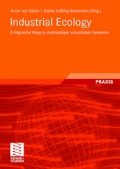Auszug
In den 1960er Jahren erlebte die Welt eine lange, nachhaltige Periode des Wirtschaftswachstums, die vielen Ländern Wohlstand und Reichtum brachte. Bereits Mitte/Ende der 1960er Jahre kam jedoch bei Boulding (1966) und Mishan (1967) die Frage auf, ob aufgrund der wachsenden Umweltbelastungen kontinuierliches Einkommenswachstum möglich bzw. wünschenswert ist. Man war der Auffassung, Wirtschaftswachstum sei unvermeidbar mit Umweltbelastungen verbunden, die auf lange Sicht den menschlichen Wohlstand mindern würden.
Access this chapter
Tax calculation will be finalised at checkout
Purchases are for personal use only
Preview
Unable to display preview. Download preview PDF.
18.6 Literatur
Kneese, A.V., R.U. Ayres and Ralph C. d’Arge (1969). Economics and the environment: a materials balance approach. Johns Hopkins Press, Resources for the Future
Boulding, K.E. (1966): The economics of the coming spaceship earth. In: Jarret, H. (Hrsg.): Environmental Quality in a Growing Economy. Johns Hopkins University Press, Baltimore, 3–14.
Bringezu, S., Schütz H., Moll, S. (2003): Rationale for and Interpretation of Economy-wide Material Flow Analysis and Derived Indicators. Journal of Industrial Ecology 7(2), 43–64.
De Bruyn, S.M. (2000): Economic Growth and the environment: an empirical analysis. Kluwer Academic publishers; Dordrecht.
Ehrlich, P.R.; Holdren, J.P. (1971): Impact of Population Growth. Science 171, 1212–1217.
European Commission and Eurostat (2001): Economy-wide material flow accounts and derived Indicators, a methodological guide. Official Publication of the European Communities, Luxembourg.
Grossman, G.M.; Krueger, A.B. (1991): Environmental impacts of a North American Free Trade Agreement. NBER working paper 3914, National Bureau of Economic Research (NBER), Cambridge.
Hüttler, W.,; H. Payer; H. Schandl (1997). National Material Flow Analysis for Austria 1992. Society’s Metabolism and Sustainable Development. Schriftenreihe Soziale Ökologie. Institut für interdisziplinäre Forschung und Fortbildung der Universitäten Innsbruck, Klagenfurt und Wien.
IVA (1998): Möjligheter och hinder på mot Faktor 10 i Sverige (Opportunities and threats on the road to a Factor 10 in Sweden). Arbetsdokument 1998:15. Royal Swedish Academy of Engineering Sciences, Stockholm, Sweden.
Mishan, E.J. (1967): The costs of economic growth. Staples Press, London.
Meadows, D.H.; Meadows, D.L.; Randers, J.; Behrens, W. (1972). The Limits to Growth: a report for the Club of Rome’s project on the predicament of mankind. Earth Island, London.
Moll, S.; Bringezu, S.; Schütz, H. (2003): Resource Use in European Countries-An estimate of materials and waste streams in the Community, including imports and exports using the instrument of material flow analysis (Zero Study). Copenhagen, European Topic Centre on Waste and Material Flows (http://waste.eionet.eu.int/mf/3)
Pearce, D. (2001): Measuring Resource Productivity, a background paper for the Department of Trade and Industry & Green Alliance conference, London, 14 February 2001
Panayotou, T. (1993): Empirical Tests and Policy Analysis of Environmental Degradation at Different Stages of Economic Development. World Employment Research Programme, Working Paper, International Labour Office, Geneva.
Stern, D.I.; Common, M.S.; Barbier, E.B. (1996): Economic Growth and Environmental Degradation: A Critique of the Environmental Kuznets Curve. World Development, 24, 1151–1160.
Umweltbundesamt (1997): Sustainable Germany — towards an environmentally sound development.
Van der Voet, E.; van Oers, L.; Nikolic, I. (2004): Dematerialization, not just a matter of weight. Journal of Industrial Ecology 8(4): 121–137.
Van der Voet, E.; van Oers, L.; Moll, S.; Schütz, H.; Bringezu, S.; de Bruyn, S.; Sevenster, M.; Warringa, G. (2005): Policy review on decoupling: development of indicators to assess decoupling of economic development and environmental pressure in the EU-25 and AC-3 countries. CML report 166. Leiden, The Netherlands: Institute of Environmental Sciences (CML), Leiden University.
Wackernagel, M.; W. Rees (1996). Our Ecological Footprint. The New Catalyst Bioregional Series no. 9, New Society Publishers.
Editor information
Editors and Affiliations
Rights and permissions
Copyright information
© 2008 Vieweg+Teubner Verlag | GWV Fachverlage GmbH, Wiesbaden
About this chapter
Cite this chapter
van der Voet, E., van Oers, L., de Bruyn, S., Sevenster, M. (2008). Wachstum ohne Umweltverbrauch? Entkopplung und Dematerialisierung als Trends. In: von Gleich, A., Gößling-Reisemann, S. (eds) Industrial Ecology. Vieweg+Teubner. https://doi.org/10.1007/978-3-8351-9225-6_18
Download citation
DOI: https://doi.org/10.1007/978-3-8351-9225-6_18
Publisher Name: Vieweg+Teubner
Print ISBN: 978-3-8351-0185-2
Online ISBN: 978-3-8351-9225-6
eBook Packages: Computer Science and Engineering (German Language)

